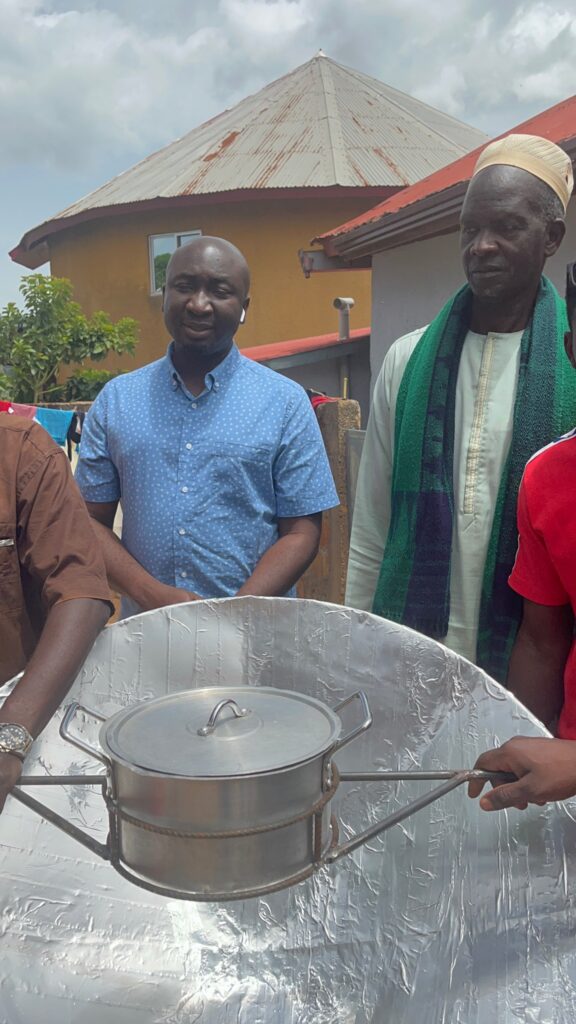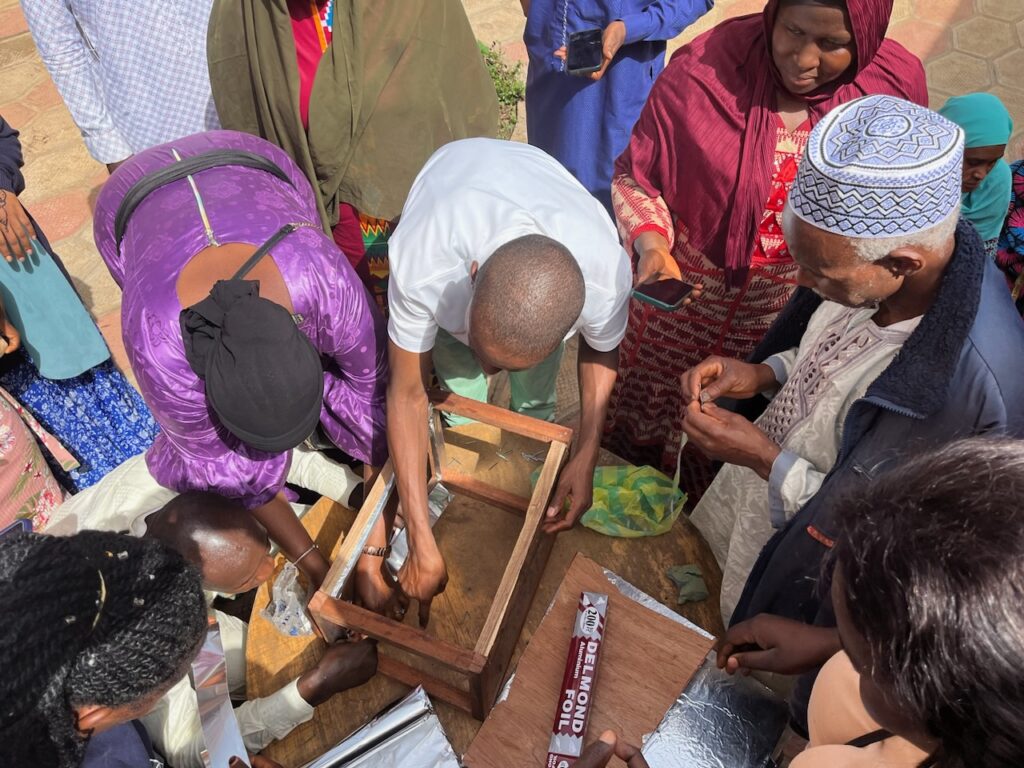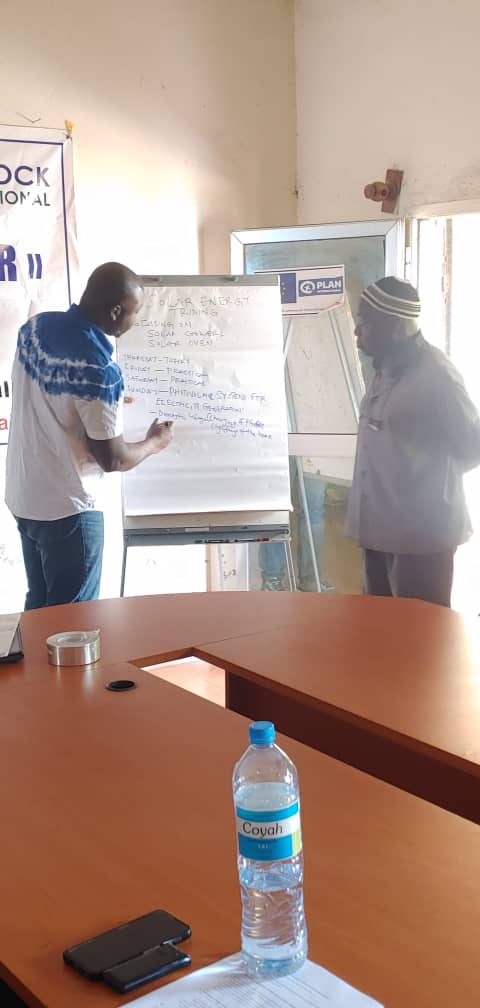Volunteer Post
Stronger Together: Advancing Innovation and Opportunity Between the U.S. and Africa
Interview with Abiodun Emmanuel Abioye
Black History Month is a time to reflect on the stories, achievements, and contributions of people of African descent across the globe. The ties between Africa and Black America run deep, shaped by history, culture, and a shared commitment to progress. While our journeys have taken different paths, the connections remain strong—woven through traditions, resilience, and a drive to build stronger communities. Nigeria, like many West African nations, has a deep and complex history, with strong cultural traditions that have spread across the world. The resilience, values, and heritage of its people continue to shape and inspire Black communities globally, highlighting the enduring connection between Africa and its diaspora.
For individuals like Winrock volunteer, Abiodun Emmanuel Abioye, these connections are more than historical—they are personal and practical. His journey from Nigeria to the United States, his work in digital agriculture, and his commitment to mentoring and volunteering reflect a broader movement of Africans and Black Americans giving back to their communities in meaningful ways.
In this interview, Abiodun shares how his background influences his work, how he stays connected to his roots, and why supporting others is a powerful way to create lasting impact. His story is a reminder that knowledge, opportunity, and innovation can bridge continents, reinforcing a legacy of leadership and contribution.
Introduction to Your Background
• Where in West Africa did you grow up?
I am Abiodun Emmanuel Abioye, I was born in Kabba, Kogi State, Nigeria.
• What are some key cultural traditions or values from your country that you continue to cherish?
Nigerian culture places a strong emphasis on respect for elders, communal living, and hospitality. The Yoruba tradition, which is prominent in my state know as Kogi State, values greetings as a sign of respect, especially when addressing elders. Festivals, such as the New Yam Festival, bring communities together to celebrate harvests. I also cherish the importance of extended family, where everyone looks out for one another.
• What inspired you to move to the United States, and how has the journey shaped your perspective?
My PhD research in digital agriculture inspired me to come to the U.S. as a postdoctoral scholar. I wanted to acquire more data driven and digital skills that I could apply to solving agricultural challenges, particularly in Africa. This journey has broadened my perspective by exposing me to advanced research techniques, diverse collaborations, and innovative solutions that can be adapted to improve food security and sustainability in Africa. It has also reinforced my commitment to giving back to my home continent through volunteering and mentorship of students.
Connection to African Heritage
• How do you celebrate and stay connected to your West African roots while living in the U.S.?
I stay connected to my African roots by maintaining strong relationships with my African brothers and sisters, both within and outside academia. Through my volunteering and mentorship of undergraduate students, I help them access scholarships and develop essential skills. I also celebrate African culture through food, music, and participating in cultural events.
• Are there specific aspects of your culture (music, food, clothing, language) that you enjoy sharing with others?
Absolutely! I cherish and proudly share Nigerian cuisine, especially dishes like eyan (pounded yam), amala, eba, and egunsi soup, as well as gbegiri soup. These meals are a must-try for anyone interested in experiencing West African cuisine. I also enjoy sharing Afrobeat music and traditional attire like agbada and ankara fabrics, which are vibrant representations of our culture.
• What does Black History Month mean to you as someone with African heritage?
Black History Month is a time of reflection, appreciation, and recognition of the struggles, resilience, and achievements of Black people worldwide. As someone with African heritage, it is a powerful reminder of the deep connections between Africa and the African diaspora. It highlights the strength of our ancestors and the contributions of Africans and African Americans in shaping history, innovation, and culture.
For me, Black History Month is also a call to action—to continue empowering African communities through knowledge, mentorship, and sustainable development efforts. It reinforces the importance of preserving our cultural identity while working towards progress, unity, and equal opportunities for all people of African descent.
Volunteer Work
• What kind of volunteer work do you do, and what motivated you to get involved?
I have been actively involved in Winrock’s volunteer program, where I train local farmers on solar energy for cooking and other sustainable agricultural practices. My motivation comes from a desire to make a tangible impact in African communities by introducing innovative, cost-effective, and environmentally friendly solutions.
• How has your experience as a migrant influenced your approach to volunteering?
Yes, my experience as a migrant has significantly shaped my approach to volunteering. Having faced challenges such as adapting to a new environment, securing educational opportunities, and navigating career paths, I understand the importance of mentorship and community support. This has driven me to give back by helping others, particularly African students and farmers, overcome similar barriers and gain access to opportunities.
• Have you been able to share your West African culture through your volunteer work? If so, how?
Yes, I have! In my volunteer work, I not only share technical knowledge but also promote the resilience and ingenuity of African culture. I integrate traditional African farming wisdom with modern technology, showing how sustainable practices have long been part of our heritage. Additionally, I engage with communities by sharing African food, language, and storytelling, making the experience more relatable and inspiring.

Community Impact
• What lessons from your upbringing or culture do you incorporate into the work you do for your community?
Growing up in Nigeria, I learned the values of hard work, community service, and perseverance. In my work, I incorporate these values by promoting collaboration, mentorship, and problem-solving. I also emphasize the importance of self-sufficiency, encouraging farmers and students to take ownership of their development through education and skill-building.
• How have you seen your volunteer efforts impact the communities you serve?
My volunteer work has led to improved agricultural practices, greater awareness of renewable energy solutions, and better access to educational opportunities for young Africans. Based on the feedback I got, most of my trainees mostly farmers and market women have successfully adopted solar-powered cooking methods, reducing deforestation and fuel costs. Additionally, I have mentored students who have secured scholarships and research opportunities, paving the way for future African innovators.
• What advice would you give others, especially those in the African diaspora, about giving back through volunteering?
My advice is simple: Start where you are, with what you have. You don’t need massive resources to make an impact. Sharing knowledge, guiding a student, or contributing to community initiatives can make a huge difference. The African diaspora has immense potential to uplift the continent through mentorship, investment, and collaboration.

Reflections on Black History
• How do you see the stories of Africans and African Americans intersecting in the larger narrative of Black history?
The histories of Africans and African Americans are deeply intertwined, from the painful past of slavery and colonialism to the shared struggles for freedom, equality, and empowerment. The contributions of African civilizations to world history, the resistance movements across the diaspora, and the cultural exchanges between Africa and African Americans show a continuous thread of resilience and strength.
• Are there any individuals (African, African American, or others) who inspire you in your work or your life?
Yes! I am inspired by individuals like Dr. Akinwumi Adesina, President of the African Development Bank, who is leading initiatives for agricultural transformation in Africa. I also admire Dr. Martin Luther King Jr., Wole Soyinka, and Nelson Mandela, whose leadership and activism have shaped history. Their commitment to justice, education, and development continues to guide my vision.
• What message do you have for younger generations about preserving cultural identity and contributing to the global Black community?
My message is for them to embrace their roots, educate yourself, and give back. Our cultural identity is a source of strength, not a limitation. Stay connected to your heritage while seeking knowledge and innovation. Use your skills and voice to uplift your community, because the future of the global Black community depends on our collective efforts.

Personal Vision
• What are your hopes for the future of African and African American communities?
I hope for a future where African and African American communities thrive through education, economic empowerment, and unity. I envision stronger collaborations in business, science, and cultural exchanges that uplift our people globally.
• How do you see your volunteer work contributing to that vision?
My work in agriculture, renewable energy, and mentorship contributes to this vision by empowering African farmers, creating sustainable solutions, and inspiring young Africans to pursue opportunities. By sharing knowledge and resources, I hope to bridge gaps and create lasting change. • If you could share one thing about your West African heritage with the world, what would it be?Our resilience and cultural diversity. West Africans have a history of adapting to challenges, preserving traditions, and building vibrant communities. From our food to our music, language, and problem-solving spirit, our rich cultural heritage is fascinating and worth celebrating.
